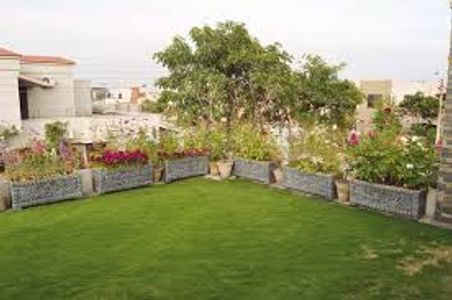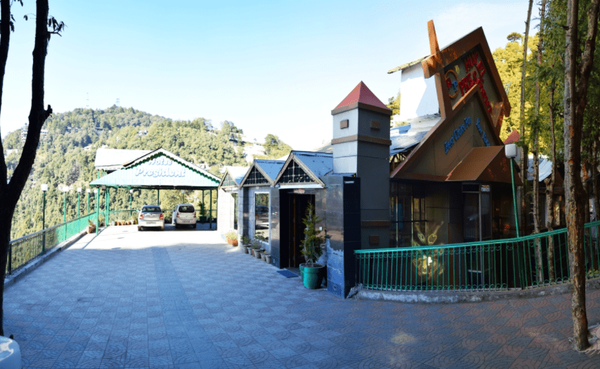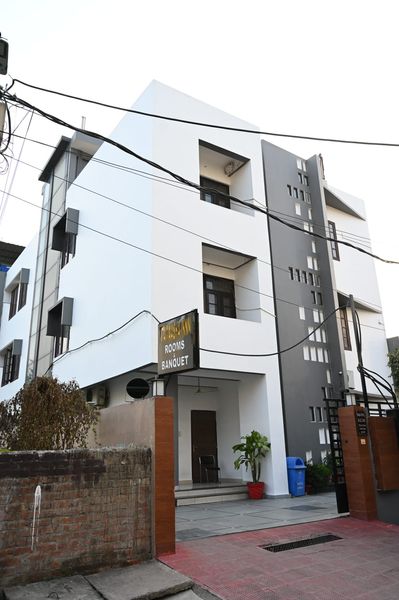"Rooftop Gardens in Pakistan: A Green Solution for Urban Living"
 Bakar Abubakar
12 Jan, 2025
11 mins read
105
Bakar Abubakar
12 Jan, 2025
11 mins read
105

Rooftop Gardens in Pakistan: Transforming Urban Spaces into Green Oases
As urbanization continues to rise in Pakistan, cities like Karachi, Lahore, Islamabad, and Rawalpindi are witnessing an increasing need for sustainable and aesthetically pleasing spaces that improve the quality of life. One such innovative solution that has gained significant popularity is the creation of rooftop gardens. A rooftop garden not only adds to the aesthetic appeal of a building but also contributes to environmental sustainability, improved air quality, and even the mental well-being of its inhabitants. In this article, we explore the growing trend of rooftop gardens in Pakistan, their benefits, challenges, and how they are transforming the urban landscape.
What is a Rooftop Garden?
A rooftop garden is a green space created on the rooftop of a building. It can consist of a variety of plants, trees, flowers, shrubs, and vegetables, often designed to create a serene, natural environment in an otherwise concrete-dominated urban space. Depending on the size and purpose of the garden, it may include pathways, seating areas, pergolas, and even small ponds or water features to enhance its appeal and functionality.
In Pakistan, where urban spaces are rapidly expanding, rooftop gardens offer a perfect solution to integrate nature into city life, especially in densely populated areas where green spaces are scarce.
Why are Rooftop Gardens Gaining Popularity in Pakistan?
Rooftop gardens are becoming increasingly popular in Pakistani cities due to a combination of environmental, economic, and social factors:
- Urban Heat Island Effect: Major cities like Karachi and Lahore experience high temperatures due to the urban heat island effect, where built-up areas absorb and retain heat more than natural landscapes. Rooftop gardens help combat this effect by providing green coverage, which cools the environment and reduces the need for air conditioning, thus lowering energy consumption.
- Limited Green Spaces: In densely populated cities, finding space for parks and gardens is becoming increasingly difficult. Rooftop gardens make use of underutilized spaces and provide an oasis of greenery without occupying valuable land.
- Sustainability and Environmental Benefits: Rooftop gardens contribute significantly to sustainability efforts by improving air quality, reducing carbon footprints, and promoting biodiversity. By growing plants, vegetables, and herbs, residents can also reduce their dependence on store-bought produce, further supporting eco-friendly practices.
- Mental and Physical Health: Urban living can be stressful, and access to nature has been shown to reduce stress, improve mental clarity, and boost overall well-being. A rooftop garden offers residents a peaceful retreat, providing them with the space to relax and reconnect with nature.
- Energy Efficiency: Rooftop gardens act as natural insulation for buildings, keeping them cooler in summer and warmer in winter. This energy efficiency reduces reliance on air conditioning and heating, leading to lower electricity bills.
- Aesthetic Appeal: The visual appeal of a lush, green rooftop can add immense value to a building, enhancing its overall aesthetic and making it a unique feature that distinguishes it from neighboring properties.
Types of Rooftop Gardens in Pakistan
Rooftop gardens can take many forms, depending on available space, budget, and the homeowner’s preferences. Some of the most popular types in Pakistan include:
- Traditional Garden: A traditional rooftop garden typically includes a variety of plants such as flowers, shrubs, and trees. It may also feature comfortable seating arrangements, shaded areas, and pathways, creating a relaxing environment for family gatherings, tea time, or evening relaxation.
- Vegetable and Herb Garden: With the increasing interest in organic farming, rooftop vegetable gardens are gaining traction. These gardens provide fresh, home-grown produce such as tomatoes, peppers, lettuce, and herbs like mint, cilantro, and basil. Rooftop vegetable gardens are an excellent way to promote sustainable living while ensuring that households have access to fresh and chemical-free food.
- Zen Garden: Inspired by traditional Japanese gardens, zen rooftop gardens aim to create a tranquil and meditative space. These gardens often include minimalist design elements like rocks, gravel, bonsai trees, and bamboo, focusing on simplicity, harmony, and natural beauty.
- Tropical Garden: For those who prefer a more exotic look, tropical rooftop gardens bring lush, tropical plants, palm trees, and flowers that thrive in warm climates. These gardens add a unique, tropical atmosphere to any rooftop.
- Urban Farming Garden: An emerging trend in Pakistan is the concept of urban farming on rooftops. These gardens are focused on growing a variety of crops, including fruits, vegetables, and herbs, with the aim of supplying food for personal consumption and local markets. This trend is gaining traction due to its sustainability and community-building potential.
Challenges of Rooftop Gardens in Pakistan
While rooftop gardens offer many benefits, there are also several challenges associated with their creation and maintenance in Pakistan:
- Structural Concerns: Not all buildings are structurally equipped to handle the weight of a rooftop garden. The foundation, drainage system, and overall structure must be assessed by engineers to ensure they can support the additional load of plants, soil, and other materials.
- Climate and Weather Conditions: Pakistan experiences a diverse range of climates, from hot and dry deserts in the south to cold winters in the north. This variability presents challenges in terms of selecting plants that can thrive under local conditions. Extreme temperatures, especially during summer, can also make it difficult to maintain certain types of gardens.
- Watering and Irrigation: One of the biggest challenges in rooftop gardening is ensuring consistent and efficient watering. In urban areas, water supply can be inconsistent, and it may be difficult to install traditional irrigation systems. Efficient watering techniques such as drip irrigation or self-watering pots can help address this challenge.
- Maintenance: Maintaining a rooftop garden requires consistent care, including pruning, replanting, and pest management. In a busy urban environment, this can become time-consuming, especially if the garden is large or involves complex design elements.
- Costs: Starting a rooftop garden can be expensive, especially if the space is large or requires significant modifications to the building. The cost of soil, plants, pots, irrigation systems, and other materials can add up, making it inaccessible for some individuals.
Popular Rooftop Gardens in Major Cities of Pakistan
Karachi:
In Karachi, rooftop gardens have become a common feature in residential buildings, especially in areas like DHA and Clifton. Some high-end residential complexes have even incorporated communal rooftop gardens that are shared by multiple tenants, creating an urban oasis in the middle of the bustling city.
Lahore:
Lahore is another city where rooftop gardens are becoming increasingly popular. In the hot summer months, residents often retreat to their rooftops to relax under shaded seating areas, surrounded by plants. Areas like Gulberg and Model Town have seen the rise of beautifully designed rooftop gardens.
Islamabad:
Islamabad, known for its lush green environment and natural beauty, has witnessed an increase in rooftop gardens, particularly in upscale neighborhoods such as F-6 and F-7. Many residents grow plants and vegetables, taking advantage of the cooler, more temperate climate.
The Future of Rooftop Gardens in Pakistan
The future of rooftop garden Pakistan looks promising, with increasing awareness about sustainability and the importance of green spaces in urban settings. The government and private sector are slowly recognizing the benefits of rooftop gardens, and there are efforts to make it easier for individuals to create their own green spaces. Initiatives to promote green architecture and environmental sustainability are likely to push the trend forward.
Moreover, with climate change and its impact on urban environments becoming more evident, rooftop gardens will continue to serve as an essential part of the solution to reducing pollution, promoting sustainable living, and enhancing the quality of life in urban centers.
Conclusion
Rooftop gardens in Pakistan offer a unique opportunity to transform otherwise unused spaces into green oases that benefit both the environment and the people living in urban areas. While challenges remain, such as structural concerns, climate conditions, and maintenance issues, the rewards of creating a rooftop garden—ranging from environmental benefits to improved mental well-being—make it a worthwhile investment for homeowners. As more people in Pakistan embrace sustainable living and eco-friendly practices, rooftop gardens are likely to become a common feature in cities, enhancing the urban landscape one rooftop at a time.
Written By:
Bakar Abubakar



Hotels at your convenience
Now choose your stay according to your preference. From finding a place for your dream destination or a mere weekend getaway to business accommodations or brief stay, we have got you covered. Explore hotels as per your mood.


